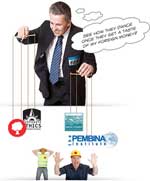The Minister of Natural Resources, Joe Oliver, released a stinging open letter on Monday, January 9, 2012, accusing what he called “enviromentaists and other radical groups” of blocking Canada’s opportunity to diversify trade and hijacking the regulatory system.
The release of the letter and an interview with Oliver came day before Joint Review Panel hearings on the Northern Gateway pipeline open in Kitamaat Village.
Text of Oliver’s letter (as posted on the Natural Resources Canada site)
Canada is on the edge of an historic choice: to diversify our energy markets away from our traditional trading partner in the United States or to continue with the status quo.
Virtually all our energy exports go to the US. As a country, we must seek new markets for our products and services and the booming Asia-Pacific economies have shown great interest in our oil, gas, metals and minerals. For our government, the choice is clear: we need to diversify our markets in order to create jobs and economic growth for Canadians across this country. We must expand our trade with the fast growing Asian economies. We know that increasing trade will help ensure the financial security of Canadians and their families.
Unfortunately, there are environmental and other radical groups that would seek to block this opportunity to diversify our trade. Their goal is to stop any major project no matter what the cost to Canadian families in lost jobs and economic growth. No forestry. No mining. No oil. No gas. No more hydro-electric dams.
These groups threaten to hijack our regulatory system to achieve their radical ideological agenda. They seek to exploit any loophole they can find, stacking public hearings with bodies to ensure that delays kill good projects. They use funding from foreign special interest groups to undermine Canada’s national economic interest. They attract jet-setting celebrities with some of the largest personal carbon footprints in the world to lecture Canadians not to develop our natural resources. Finally, if all other avenues have failed, they will take a quintessential American approach: sue everyone and anyone to delay the project even further. They do this because they know it can work. It works because it helps them to achieve their ultimate objective: delay a project to the point it becomes economically unviable.
Anyone looking at the record of approvals for certain major projects across Canada cannot help but come to the conclusion that many of these projects have been delayed too long. In many cases, these projects would create thousands upon thousands of jobs for Canadians, yet they can take years to get started due to the slow, complex and cumbersome regulatory process.
For example, the Mackenzie Valley Gas Pipeline review took more than nine years to complete. In comparison, the western expansion of the nation-building Canadian Pacific Railway under Sir John A. Macdonald took four years. Under our current system, building a temporary ice arena on a frozen pond in Banff required the approval of the federal government. This delayed a decision by two months. Two valuable months to assess something that thousands of Canadians have been doing for over a century.
Our regulatory system must be fair, independent, consider different viewpoints including those of Aboriginal communities, review the evidence dispassionately and then make an objective determination. It must be based on science and the facts. We believe reviews for major projects can be accomplished in a quicker and more streamlined fashion. We do not want projects that are safe, generate thousands of new jobs and open up new export markets, to die in the approval phase due to unnecessary delays.
Unfortunately, the system seems to have lost sight of this balance over the past years. It is broken. It is time to take a look at it.
It is an urgent matter of Canada’s national interest.
In an interview with CBC News, Oliver expanded his comments, saying there was a marked difference between foreign investors and the radicals.
Oliver said radicals are “a group of people who don’t take into account the facts but are driven by an ideological imperative.”
Not all groups are radical, he says, but some are opposed to any use of hydrocarbons.
While Oliver took aim at foreign funding for environment groups, foreign investment is a major part of the oilsands. American, British, Chinese, French and Norwegian companies have all invested in the oilsands.
The difference, Oliver says, is that Canada needs the foreign capital.
“We don’t have enough capital in Canada to finance it and that’s why there’s a lot of investment from the United States, the U.K., France, and Norway, and other countries, and so we welcome that because we need it,” he said.

